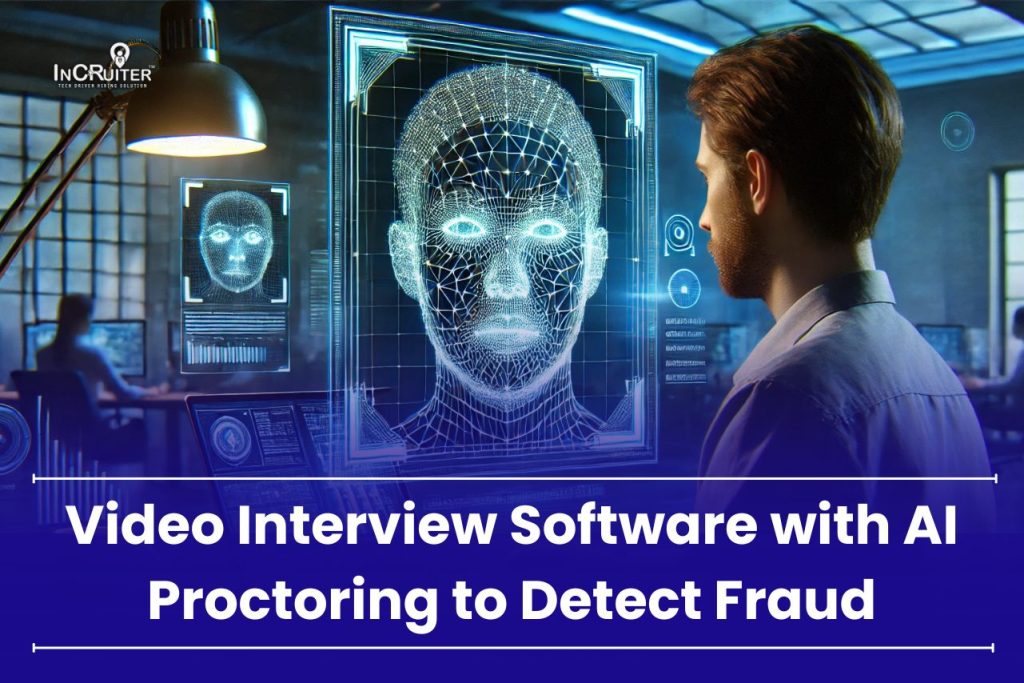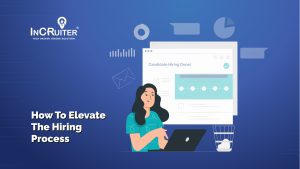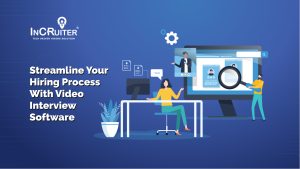
You trust your hiring process. You’ve got structured interviews, expert evaluators, and a well-defined screening method. But what if the person you hired was never the one you interviewed? It sounds impossible, right? Yet countless companies unknowingly fall victim to interview fraud, losing crores in wasted salaries, project failures, and security risks. With the rise of Video Interview Software, hiring should have become more efficient, but instead, fraudsters have found new ways to manipulate the system.
In this blog, we’ll uncover how AI proctoring exposes hidden deception and why businesses must act before the damage is irreversible.
The Rising Threat of Interview Fraud in Virtual Hiring
Cheating in job interviews isn’t a new trick, but it has reached a whole new level. With more companies hiring online, the methods used to fake skills and qualifications have become far more advanced. In the past, people would tweak their resumes or exaggerate their experience to get hired. Now, technology has opened the door to far more deceptive tactics.
The shift to remote work changed everything. As businesses moved to online hiring, fraudsters saw an opportunity. Fake candidates no longer just stretch the truth on paper; they use deepfake, hire stand-ins for interviews, and even rely on artificial tools to answer real-time technical questions. These tricks make it easier than ever for unqualified people to slip through the hiring process unnoticed.
For companies, this isn’t just a minor problem; it can lead to severe damage. Hiring someone who fakes their way in means wasted time, lost money, security risks, and significant drops in productivity. As long as businesses depend on virtual hiring, these risks will continue to grow.
Also read: Top 5 Video Interviewing Tools to Streamline Virtual Hiring
The Hidden Costs of Interview Fraud for Companies
Hiring someone who isn’t the right fit isn’t just an inconvenience it’s a financial mess. According to the U.S. Department of Labor, a single hiring mistake can wipe out up to 30% of the employee’s first-year pay. Now, the losses could exceed $240,000 per person if you’re looking at a high-paying job.
Big companies have felt the sting. IBM once lost $400 million due to hiring missteps, while Zappos estimated that their bad hires drained over $100 million. A CareerBuilder report uncovered that 74% of employers have made hiring mistakes, with an average loss of $17,000 per bad hire.
So, where does all this money go? It’s not just about paying a salary to the wrong person. The real damage comes from work not getting done correctly, extra costs for replacing the hire, and even security risks. These problems pile up fast, making it clear that stopping interview fraud isn’t an option; it’s a must.
Also Read: Everything You Need to Know About AI Proctoring Software
Common Types of Interview Fraud Every Company Should Watch For
Proxy Interviews
Some job seekers go to great lengths to land a role, even if it means hiring someone else to take their interview. This trick is widespread in video interview software in remote hiring since there’s no direct way to verify who’s actually speaking on the screen. Some use pre-recorded clips, camera hacks, or even lookalikes to fool recruiters. Companies have found themselves onboarding candidates who seemed perfect during interviews but later turned out to be far less skilled. Sectors like IT, finance, and healthcare face the biggest risks hiring an unqualified person in these fields can cause legal trouble, financial damage, and security threats.
Deepfake and Identity Scams
Technology is making deception harder to spot. With AI-generated deepfake videos, fraudsters can change their appearance, mimic lip movements, and even alter their voice in real time. This makes it easy for someone to pose as a completely different person during an interview. On top of that, fake degrees, forged certificates, and stolen personal details make it even tougher for hiring teams to catch fraud. The impact is serious companies waste resources bringing in employees who don’t actually have the skills needed. Standard background checks often fall short because they focus on documents, not verifying if the person behind them is real.
Secret Assistance in Live Interviews
Some candidates rely on outside help to pass interviews. Hidden earpieces, chat apps, and AI-generated answers have all become tools for job seekers trying to cheat the system. Some set up an expert off-camera who feeds them answers in real time. Others use smart glasses that flash hidden text or software that crafts instant responses. Since they appear to be answering naturally, this kind of trick is hard to catch. But slight delays in speech, awkward pauses, or robotic-sounding responses can sometimes reveal the truth. Unfortunately, many companies don’t spot the deception until after hiring someone who struggles to perform on the job.
Fake Resumes and Credentials
Lying on resumes is more common than ever. Some candidates stretch the truth about their experience, list fake certifications, or even make up entire work histories. A study in 2023 showed that more than 40% of job seekers admitted to exaggerating their skills. With AI, scammers can even create professional-looking LinkedIn profiles with fake recommendations. Manual resume reviews alone aren’t enough to detect these fabrications, and without careful cross-checking, companies can end up hiring someone who lacks the expertise they claimed to have. In industries where compliance and technical skills matter, such mistakes can lead to expensive errors, lawsuits, and workflow disruptions.
Cheating in Pre-Hire Assessments
When hiring for technical roles, companies often rely on coding tests and skill assessments. But some candidates find ways to game the system. They use AI to generate correct answers, copy code from online sources, or even pay experts to take the test for them. Screen-sharing tools allow them to get live assistance during exams, making remote assessments easy to manipulate. Without strict monitoring, recruiters might unknowingly hire someone who lacks the ability to solve problems independently. Bringing in underqualified developers, analysts, or engineers can slow down projects, increase turnover, and cost businesses valuable time and money.
Also read: Why your hiring funnel fails without the right Video Interview Software?
How AI Proctoring help Companies to combat Interview Fraud effectively?
AI-Driven Identity Checks
Ever heard of someone hiring a stand-in to ace their interview? It happens more often than you’d think! AI-powered identity checks come with video interview software to make sure no one gets away with it. Using facial recognition and document matching, the system confirms if the person on-screen is the same as the one on the ID. Liveness detection goes further it spots pre-recorded clips or deepfake attempts. Think static images or altered videos can fool the system? Not a chance. Recruiters get to assess the real person, not a fake stand-in.
Live Monitoring & Real-Time Tracking
Picture a candidate answering every question ideally but glancing sideways every few seconds. Suspicious, right? AI tracks movement, facial cues, and even background sounds. It flags anything unusual: whispering voices, sudden pauses, or an extra face showing up on the screen. The system doesn’t just record it learns. If a person hesitates right before every answer, AI notices. Real-time alerts let recruiters act on the spot, stopping fraud before it’s too late.
Typing & Mouse Activity Detection
Your typing style is as unique as your fingerprint. AI picks up on how a person types the speed, rhythm, and even tiny pauses. If someone’s typing suddenly changes mid-interview, it’s a red flag. Maybe they switched to a ghostwriter? Perhaps they copied a response from another source? AI watches mouse activity, too. Hesitating before answering? Clicking between screens? These digital footprints reveal whether someone actually knows their stuff or is just good at faking it. No more mystery helpers feeding answers behind the scenes.
Screen Lock & Tab Restrictions
Some people think they can outsmart an online test by quietly searching for answers. AI has other plans. Browser lockdown stops candidates from switching tabs, using incognito mode, or launching extra apps. Some tools even scan reflections in glasses (yes, really!) to catch candidates reading from another screen. AI Proctoring Software detects if someone is copy-pasting text instead of typing naturally. If a candidate tries to cheat, the system catches them in real-time.
Voice & Audio Scanning
Ever seen someone pretend to talk while someone else feeds them answers? AI catches that. It analyzes voice tone, pitch, and speaking patterns. If the voice doesn’t match recordings from earlier rounds, it’s a red flag. AI also removes background noise, picking up whispers or someone guiding responses off-screen. Some tools even track speech rhythm because no one answers everything in a perfect, rehearsed tone without pausing. If a response sounds too polished, something’s not right.
Code Copy-Paste Detection
Meet the “copy-paste champions.” AI-powered tools stop them in their tracks. When a candidate submits code, AI compares it against thousands of open-source libraries, past test answers, and coding forums. If it finds a match, the system flags it instantly. Some tools analyze coding patterns, too; if someone usually writes Python but suddenly submits perfect Java code, it looks suspicious. AI can even replay keystrokes to check if they typed it or just pasted it.
Behavior Tracking & Eye Movement Analysis
Body language speaks volumes, even on a screen. AI tracks small details, eye shifts, unnatural stillness, and odd delays before answering. If someone keeps glancing to the side or suddenly freezes when asked a tricky question, it’s worth a closer look. AI learns patterns, so if a person answers difficult questions quickly but struggles with simple ones, it raises questions. Recruiters can tell who’s confident and who’s faking it.
Location & IP Monitoring
Ever had a candidate say they’re in one city, but their IP says otherwise? AI spots that. It tracks logins, flags sudden location changes, and detects VPN use. If a candidate’s first interview happens from one country but their final round comes from another, recruiters are notified. No more fake candidates outsourcing tests to someone else.
Secure Logins with Two-Step Verification
A simple login isn’t enough anymore. AI-powered interview tools add an extra security layer with two-step verification. Before starting, candidates confirm their identity with a code sent to their phone or email. Some systems go a step further, using facial recognition or fingerprint scans. Even if someone tries to share login details, only the actual candidate can access the interview. A small step, but it makes a huge difference.
AI-Generated Fraud Reports
Imagine having an assistant who detects fraud and documents everything. AI generates reports with timestamps, flagged incidents, and behavior patterns. If a candidate keeps looking off-screen or hesitates before answering, it’s logged. Some tools even provide short video clips of suspicious activity. Instead of reviewing hours of footage, recruiters get a neat fraud summary, making hiring decisions much more effortless.
Also read: Why is Video Interview Software Essential for Modern Recruitment?
Conclusion
Interview fraud is no longer a rare occurrence. It’s an evolving threat that continues to outpace traditional hiring safeguards. As technology advances, fraudsters are finding new ways to manipulate video interviews and assessments, making it crucial for companies to stay ahead. Ignoring this risk can lead to financial losses, wasted resources, and compromised security. The only way forward is a proactive approach. Businesses must integrate AI-driven fraud detection tools to ensure hiring authenticity.
InCruiter secure Video Interview Software offers the protection you need. Invest in fraud-proof hiring today before your next bad hire costs you more than you expect.
Ready to Transform Your Hiring Process?
Discover how our AI-powered interview platform can streamline your recruitment and find the best candidates faster.






